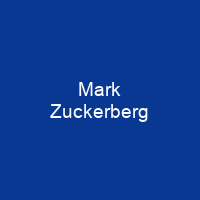Mark Elliot Zuckerberg: The Man Behind Facebook
Who is Mark Zuckerberg, and why does his name ring a bell? He’s the co-founder of Facebook, now Meta Platforms, and one of the world’s most influential individuals. Born on May 14, 1984, in White Plains, New York, Zuckerberg has transformed social media into an integral part of our daily lives.
A Childhood of Code
From a young age, Zuckerberg was fascinated by computers and programming. He created programs like ‘ZuckNet’ and the Synapse Media Player in his childhood. At Harvard University, he studied psychology and computer science, further honing his skills with projects such as CourseMatch and Facemash.
The Launch of Facebook
In January 2004, Zuckerberg launched ‘Thefacebook’ alongside his roommates Eduardo Saverin, Andrew McCollum, Dustin Moskovitz, and Chris Hughes. The inspiration for this social networking site came from the Phillips Exeter Academy’s student directory, ‘The Photo Address Book.’ However, the launch was not without controversy; three Harvard seniors accused Zuckerberg of misleading them into building a competing network called HarvardConnection.com.
From Hackathons to Billionaire
Zuckerberg’s early career included hackathons where Facebook staff would work on projects for one night. He was even listed among the top 35 innovators under 35 by MIT Technology Review in 2007. By 2012, his net worth had skyrocketed to $23 billion, making him a self-made billionaire at just 28 years old.
Facebook’s Growth and Expansion
Zuckerberg’s vision for Facebook was clear: create an open information flow for people. In 2010, the film ‘The Social Network’ brought his story to the big screen, winning multiple Academy Awards. Zuckerberg aimed to connect 5 billion people who didn’t have internet access through initiatives like Internet.org and mobile technology.
Philanthropy and Activism
Zuckerberg has been a significant philanthropist, donating millions to various causes. In 2010, he pledged to give away 99% of his wealth through the Chan Zuckerberg Initiative (CZI), focusing on advancing human potential and promoting equality.
Controversies and Legal Battles
Zuckerberg has faced numerous lawsuits over Facebook’s operations. Notable cases include ConnectU lawsuits, the ‘Draw Muhammad’ contest controversy in Pakistan, and the Ceglia lawsuit regarding ownership of Facebook. Despite these challenges, Zuckerberg remains committed to his vision for a more connected world.
Personal Life
Beyond business, Zuckerberg’s personal life is equally intriguing. He married Priscilla Chan in 2012 and has two daughters. His philanthropic efforts extend beyond technology; he supports education and health initiatives through the CZI. Zuckerberg’s style has evolved over the years, from his early days to his current preference for gold chains and streetwear.
Conclusion
Mark Zuckerberg’s journey from a Harvard student to one of the world’s most influential figures is nothing short of remarkable. His vision for Facebook and his commitment to philanthropy have shaped not only technology but also society as a whole. As he continues to navigate both personal and professional challenges, Zuckerberg remains a pivotal figure in our digital age.

You want to know more about Mark Zuckerberg?
This page is based on the article Mark Zuckerberg published in Wikipedia (retrieved on February 9, 2025) and was automatically summarized using artificial intelligence.






